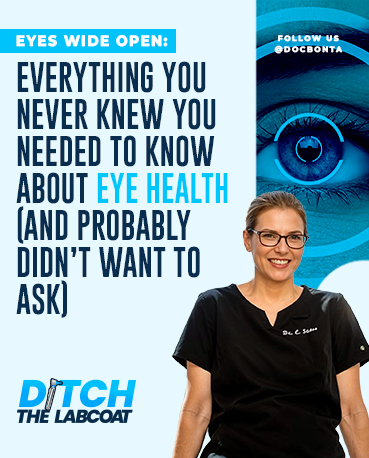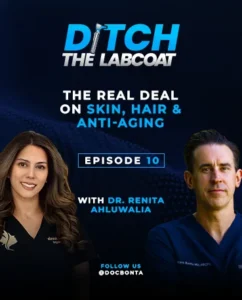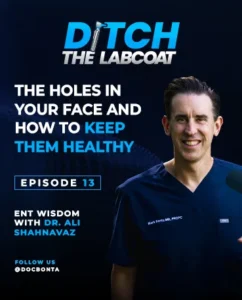Today, we had the pleasure of chatting with Dr. Christine Suess, a renowned ophthalmologist with a laser focus (pun totally intended) on keeping our peepers in peak condition. It was an enlightening conversation that covered everything from aging eyes to creepy eye goo—so buckle up, squint your eyes, and dive into the world of eye health with us!
When Did the Eye Have It?
We kicked things off with the big question: *When did Dr. Suess know she was destined to stare into eyeballs for a living? Turns out, the path wasn’t as clear as, well, 20/20 vision. Initially, she had dreams of being a cardiovascular surgeon (cue heart emoji), but after some friendly advice from nurses and a fateful encounter with her now-optometrist husband, she pivoted to ophthalmology. And thank goodness for that, because now she’s saving our vision one cataract at a time.
Ophthalmologist vs. Optometrist: Eye Spy the Difference
Here’s the scoop: Optometrists are the go-to folks for routine eye exams, glasses, and treating certain eye conditions like glaucoma and pink eye. But if your eyes need a scalpel, Dr. Suess is your woman. “If you need surgery, you’re going to see an ophthalmologist,” she explained. In Canada, you can’t just walk in and see an ophthalmologist; you’ll usually need a referral from an optometrist or your family doctor.
But here’s the funny part—Dr. Suess is married to an optometrist, so their household must have some interesting dinner table conversations. Imagine the eye-chart debates!
https://cornwallhospitalfoundation.ca/dr-christine-suess-dr-denis-dubuc/
The Great “Over-40 Eye Crisis”
I confessed to Dr. Suess that I’ve been struggling with blurry text and squinting at my phone lately, much to the amusement of my family. Her diagnosis? Welcome to the 40s club, where presbyopia starts creeping up on you. “The lens in your eye starts to harden,” she explained. “You’re not alone; everyone goes through it.”
https://www.youtube.com/watch?v=FsvaX8KA1NA
And if you’re wondering if all that screen time is accelerating our collective vision decline, Dr. Suess reassured me that while it’s not pushing presbyopia forward, it *is* contributing to more myopia (a.k.a. nearsightedness) in kids. Apparently, the solution is simple: take breaks from screens. So put down your phone (after reading this blog, of course) and stare into the distance every now and then.
Kids, Screens, and the Rise of Myopia
Speaking of kids, if your little ones are squinting at the whiteboard in school or holding their tablets an inch from their noses, it might be time for an eye check. Dr. Suess mentioned that prolonged screen use is possibly contributing to more cases of myopia in children. And if you’re thinking, “Well, just have them go play outside,” you’re on the right track. Sunlight exposure helps, but getting kids off their devices is easier said than done.
https://pmc.ncbi.nlm.nih.gov/articles/PMC10912377/
Eye Health: Drops, Sleepy Sands, and Staring Contests
We couldn’t resist diving into the mysteries of sleepy sands (you know, that eye crust kids wake up with). Dr. Suess broke it down: a little bit of eye gunk in the morning is normal, but if it’s crusting over like a pie topping, you might have a case of blepharitis. Her solution? A warm washcloth over the eyes for a few minutes. It’s like a spa treatment for your eyelids.
And here’s a fun fact: If you’re losing staring contests to your kids, Dr. Suess has a tip—squeeze your eyes shut for a few seconds before the match. It’s all about prepping those Meibomian glands to keep your eyes lubricated. Finally, a reason to win family game night!
https://www.aao.org/eye-health/diseases/what-is-sleep-crust
The “Visine” Myth and Other Eye Care Faux Pas
Dr. Suess wasn’t shy about taking down some popular eye care myths. Ever reached for Visine to “get the red out”? According to her, that’s a big no-no. The active ingredient in Visine can cause rebound redness and, even worse, potentially raise the pressure in your eyes, increasing your risk of glaucoma. Instead, she recommends sticking to preservative-free artificial tears.
And don’t get her started on Polysporin drops for red eyes. Sure, they might seem like a quick fix, but they can cause allergic reactions, making things worse. In her words: “Just don’t.”
Cataract Surgery: The Eye Dentist’s Masterpiece
Let’s clear up a misconception: Ophthalmologists are **surgeons**. They’re not just eye dentists (a jab thrown around by orthopedic surgeons). So, what’s it like to operate on the eye? Turns out, it’s a blend of precision, patience, and a steady hand.
Dr. Suess walked us through the process of cataract surgery. The eye is numbed with drops (no giant needles involved anymore, phew!), and patients don’t feel pain—just pressure. And no, you can’t blink because there’s a tiny device called a speculum holding your eyelids open. Sounds like something out of a sci-fi movie, but hey, it works.
https://www.youtube.com/watch?v=n_3cG9oeuNo
Sunglasses: A Must-Have for Retinal Health
We’ve all heard it before: wear your sunglasses! Dr. Suess doubled down on this advice, especially when it comes to protecting against macular degeneration and cataracts. And if you’re buying those cool pit vipers or whatever’s trending on TikTok, make sure they have 100% UVA and UVB protection. Otherwise, you might be doing more harm than good.
And no, knockoff brands from Amazon aren’t guaranteed to protect your eyes. Those $18 “bargains” might just be frying your retinas while you think you’re playing it cool.
Eye Emergencies and What To Do (Spoiler: Don’t Panic)
We wrapped up the conversation with a discussion on eye emergencies. Whether it’s angle-closure glaucoma or seeing flashing lights and floaters, don’t wait it out. “If you’re on a remote island and see floaters, you need help fast,” Dr. Suess warned. Basically, you’re better off trying to MacGyver a makeshift SOS signal than trying to self-diagnose.
The Future of Eye Surgery: Will Robots Take Over?
Robots might be great at vacuuming your floors, but can they do delicate eye surgery? Maybe one day, but Dr. Suess isn’t worried about losing her job to a machine just yet. “We’ll always need someone to guide the robotics,” she assured me. So if you’re an aspiring ophthalmologist, there’s still time to join the ranks before AI takes over.
Parting Wisdom: Screen Breaks, Sunglasses, and Regular Eye Exams
Dr. Suess left us with some simple yet powerful advice: Take breaks from your screens, wear good sunglasses, and don’t skip your eye exams. Your eyes are pretty good at taking care of themselves, but they’re not invincible. And trust me, after this chat, I’m setting a timer to look away from my screen every 20 minutes. (I might even buy some fancy eye drops while I’m at it.)
So, there you have it, folks—a masterclass on eye health, packed with tips, tricks, and enough technical jargon to impress your optometrist. Until next time, keep your eyes wide open and your Visine safely in the trash.
Cheers to clear vision!



